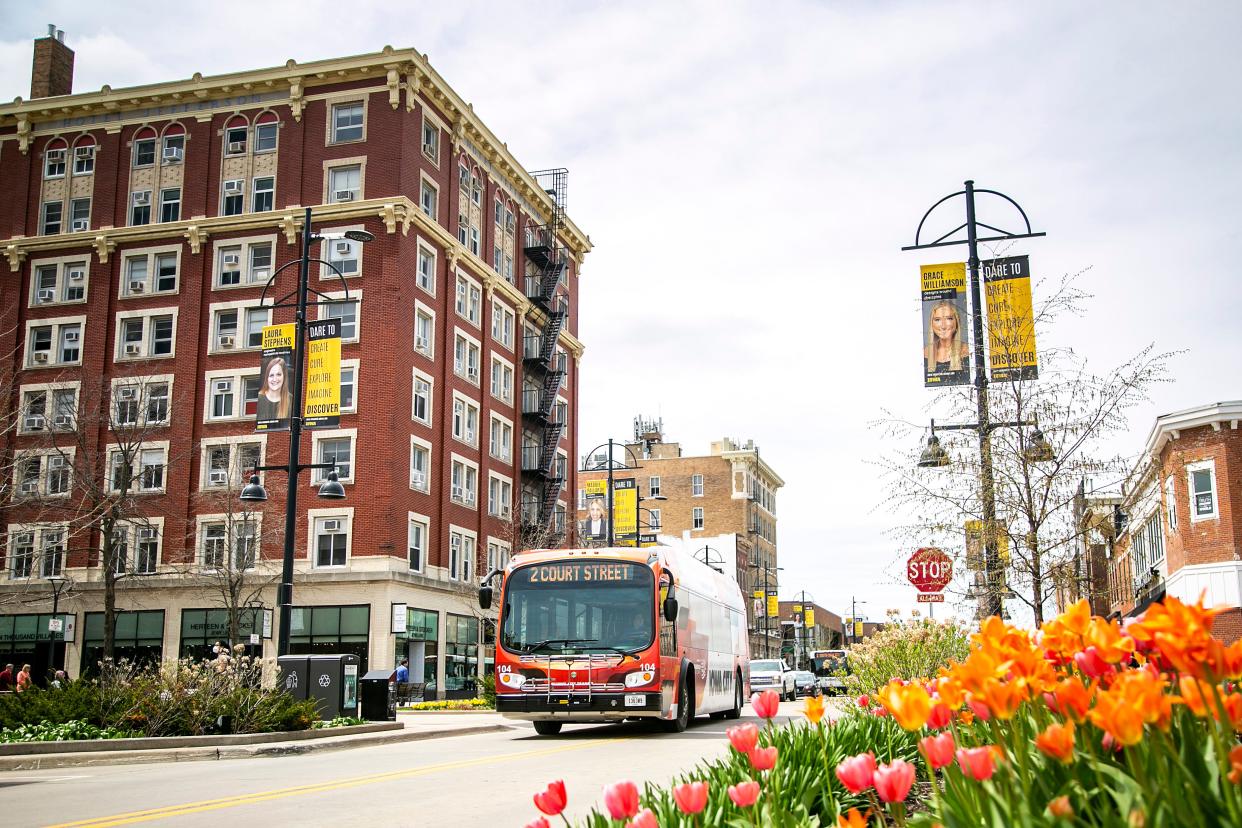Free Ride: Local zero-fare bus transit approved by Iowa City Council

Come on and take a free ride.
Residents will soon have access to fare-free rides through the Iowa City Transit system as part of a pilot program approved by the city council on Tuesday.
The program, which is set to begin at some point in 2023, will run for at least two years as the city assesses how a zero-fare system impacts operations. They'll also seek a revenue replacement for the expected revenue loss of nearly $1 million per year.
The city plans to use federal transportation grant money to fill the budgetary gap while they'll monitor the program's longterm impact.
When will the free rides begin?
City staff indicated that the program is expected to begin in the late summer or fall and run through at least 2025. The city will use the next few months to strategize promotion and logistics and refund passengers who had already purchased bus passes.
“We want to be able to build a brand and a message to be able to put this out there,” City Manager Geoff Fruin said.
Mark Rummell, the associate director of transportation services, told the council the current plan is to cover the fare boxes rather than remove them. However, if the zero-fare system is not permanent, he said the current fare boxes would need to be replaced, coming “at a pretty hefty price tag.”
To meet federal reporting requirements, the bus system needs to keep track of its ridership, previously done through fare boxes. However, Rummel suggested transportation services could use clickers or adopt a system similar to the university’s bus system to make the process easier.
“Through our bus tracking software and the tablets that are in the buses, there’s a module that we can purchase that CAMBUS actually uses right now that seems to work pretty well,” Rummell said.
Efficiency and alignment with city’s equity, climate, and economic goals
The zero-fare trial will address key aspects of the city’s five-year Strategic Plan, helping move closer to the city’s economic goals by providing transportation across Iowa City and putting more money back into local pockets.
Darian Nagle-Gamm, director of transportation services, said the program could address many of the city’s goals as outlined in its strategic plan.
“This is one of those rare, rare community projects that will truly address climate, equity, economic objectives, livability objectives,” Nagle-Gamm told the council in May. “It could really put Iowa City on the map… in all honesty, the ease with which people move throughout (a) community is a hallmark of a great community.”
More: Photos: Clear Creek Amana breaks ground on new elementary school in Coralville
Nagle-Gamm believes ridership should increase from 20% to 60% and it would also help reduce the city's carbon footprint because residents would be less inclined to drive.
“It will hopefully help boost the local economy by keeping dollars in people's pockets,” Councilor Andrew Dunn said on Tuesday. “In doing that, it is going to help the poor and working people save money and spend it on other necessities.”
Additional benefits of a zero-fare transit system include reduced conflicts at the farebox, improving on-time arrivals. The initiative would also support the city’s climate action and livability goals while removing barriers to public transit use, Nagle-Gamm said.
“And whether that barrier is the cost or the fact that you have to go somewhere, get a pass, figure out how to work the farebox. It’s something you have to do to get onto the bus," Nagle-Gamm said.
More: Iowa City, Johnson County partner to fund $2 pay increase for childcare workers
Iowa City Transit does not plan to increase staff or its bus fleet. However, the department is willing to consider expansion if the data from the city indicates a change in demand.
Councilor John Thomas said that the council could also explore service expansion to areas with affordable housing.
“When we make these transit enhancements and improvements, there is an opportunity to incentivize its use by aligning our land use accordingly,” Thomas said. “We are certainly advancing our transit system, so it will be interesting to see if we can take advantage of that.”
How does a city fund a zero-fare bus system?
Public transportation fare revenue made up 8% of Iowa City Transit’s funding resources in fiscal year 2022 and had a zero-fare policy existed in FY 2022, $871,902 in fare revenue would have been lost. Nearly half of the funding for Iowa City Transit in FY 2022 came from property taxes through a transit levy.
Money from the Federal Transit Administration’s urbanized area formula grants is important to Iowa City Transit’s income, Nagle-Gamm told the council in a May work session. That funding source becomes an issue for Iowa City Transit after 2026, the director said.
More: See photos of construction at Pinseekers golf driving range in Tiffin
The Bipartisan Infrastructure Law authorized up to $108 billion to support federal public transportation programs, according to the FTA, though whether that funding will continue past 2026 or halt is unknown, Nagle-Gamm explained.
Federal funds are distributed by the Metropolitan Planning Organization of Johnson County to Iowa City Transit based on a formula considering multiple criteria, including fare revenue.
According to last year's distributions, Iowa City Transit would lose $600,000 annually by moving to a zero-fare system if there are no changes to the MPOJC’s formula.
So, Nagle-Gamm said the City of Iowa City would need to propose a change to the formula to ensure funding continues regardless of the change to zero-fare.
This article originally appeared on Iowa City Press-Citizen: Council approves free bus rides across Iowa City in zero fare push
